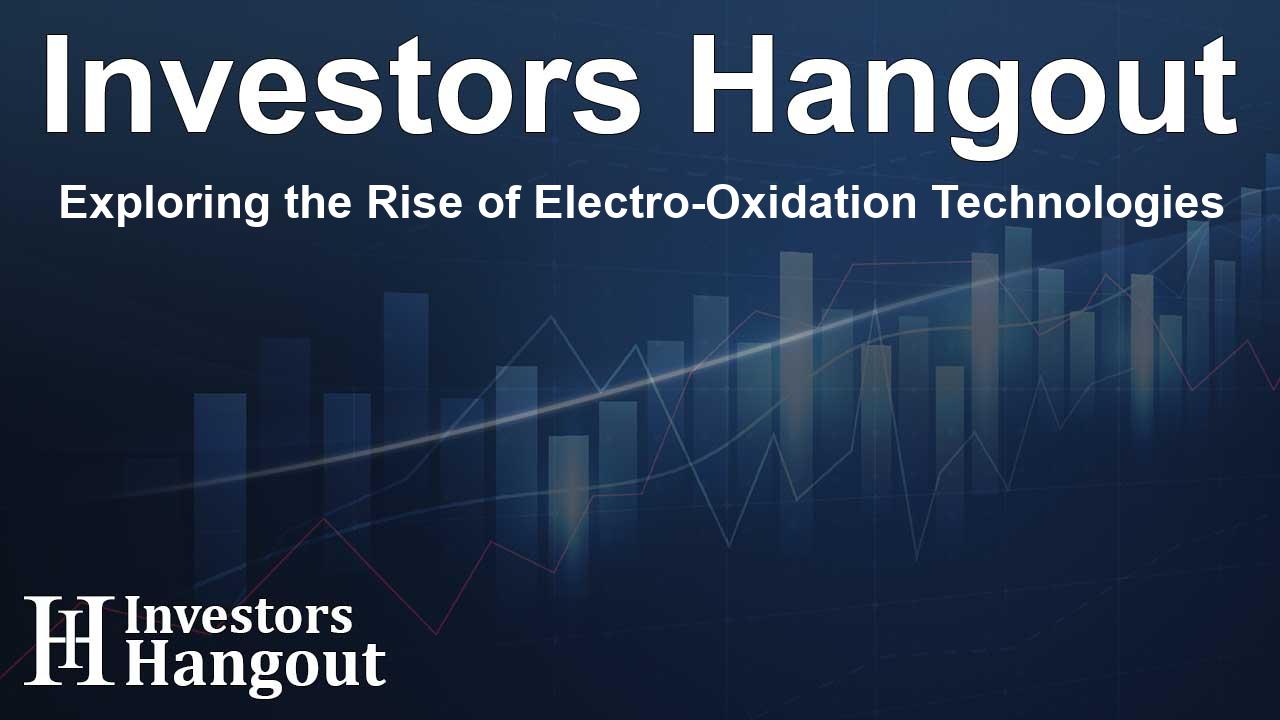Exploring the Rise of Electro-Oxidation Technologies

Insights into the Electro-Oxidation Market
The electro-oxidation market is witnessing remarkable growth, projected to rise from USD 1.6 billion to USD 2.1 billion by 2030. This expansion mirrors the increasing demand for efficient water treatment technologies designed to address critical global water challenges such as pollution and scarcity.
Understanding the Need for Advanced Water Treatment
As public health concerns and environmental regulations grow stringent, industries are compelled to adopt innovative and effective water treatment solutions. Electro-oxidation stands out as a pioneering method. Unlike traditional methods, it decomposes tough pollutants without resorting to chemical additives, aligning with the rising need for sustainable practices.
How Electro-Oxidation Works
This technology utilizes advanced oxidation processes to breakdown contaminants, including pharmaceuticals and heavy metals, making it vital for sectors like municipal water treatment and industrial manufacturing. The capacity of electro-oxidation to treat wastewater of various complexities is particularly appealing, providing an alternative to outdated systems.
Categories Within the Market
The market is categorized mainly into indirect and direct electro-oxidation methods. Among these, indirect electro-oxidation is expected to capture the largest share due to its cost-effectiveness and versatility in managing diverse wastewater challenges.
Advantages of Indirect Electro-Oxidation
Implementing indirect methods enables the generation of reactive species that effectively reach pollutants located further away from electrode surfaces. This method is particularly beneficial for treating complex wastewater, often generated from industries such as textiles and food production. The use of economical electrodes further reinforces its accessibility and adoption in various sectors.
Importance of Electrode Materials
Within the realm of electro-oxidation, the type of electrode material significantly impacts treatment efficiency. Boron-doped diamond electrodes are leading the market due to their superior ability to degrade persistent pollutants. These electrodes are robust and effective, making them ideal for applications requiring stringent regulatory compliance.
Applications in Real-World Scenarios
Industries are increasingly recognizing the value of boron-doped diamond electrodes for wastewater treatment. Successful government-funded projects demonstrate their effectiveness in eliminating harmful substances like per- and polyfluoroalkyl compounds, showcasing their potential in meeting environmental standards.
Applications and Benefits of Electro-Oxidation
The market also identifies significant growth in applications targeting organic and micropollutant treatment. Electro-oxidation shines in removing contaminants conventional methods struggle with. For instance, growing urbanization and industrial activities have led to more complex wastewater streams; electro-oxidation addresses the treatment demands placed on these systems.
Environmental Compliance and Electro-Oxidation
The urgent need for effective environmental compliance solutions underpins the growth of the municipal water and wastewater sectors. Traditional techniques often fall short in eliminating modern types of pollutants found in municipal waste. Electro-oxidation offers a versatile solution, enabling effective treatment while ensuring compliance with regulatory frameworks.
Key Players in Electro-Oxidation
Various companies are emerging as leaders in the electro-oxidation space, adopting innovative approaches to enhance treatment efficiency. This competitive landscape is characterized by organizations striving to leverage advanced technologies in wastewater management.
Collaboration between these companies and research institutions is fostering innovation, potentially revolutionizing the way we approach water treatment moving forward.
The Future of Electro-Oxidation
As technological advancements continue to unfold, the electro-oxidation market seems poised for growth. It represents not only a shift towards sustainable treatment solutions but also showcases an optimistic path toward water management that meets contemporary challenges.
Frequently Asked Questions
What is electro-oxidation?
Electro-oxidation is an advanced water treatment process that utilizes electric current to decompose pollutants without chemical additives.
How is the electro-oxidation market expected to grow?
It's projected to expand from USD 1.6 billion to USD 2.1 billion by 2030, reflecting increased demand for sustainable water solutions.
What are the main advantages of using boron-doped diamond electrodes?
Boron-doped diamond electrodes offer high oxidative efficiency and stability, making them effective in degrading persistent pollutants in wastewater.
How does electro-oxidation benefit municipal water treatment?
Electro-oxidation enhances the removal of emerging contaminants, ensuring compliance with evolving environmental standards and improving drinking water quality.
Why is indirect electro-oxidation favored over direct methods?
Indirect electro-oxidation is often more cost-effective and adaptable to various wastewater treatment needs, making it a preferred choice for many industries.
About The Author
Contact Thomas Cooper privately here. Or send an email with ATTN: Thomas Cooper as the subject to contact@investorshangout.com.
About Investors Hangout
Investors Hangout is a leading online stock forum for financial discussion and learning, offering a wide range of free tools and resources. It draws in traders of all levels, who exchange market knowledge, investigate trading tactics, and keep an eye on industry developments in real time. Featuring financial articles, stock message boards, quotes, charts, company profiles, and live news updates. Through cooperative learning and a wealth of informational resources, it helps users from novices creating their first portfolios to experts honing their techniques. Join Investors Hangout today: https://investorshangout.com/
The content of this article is based on factual, publicly available information and does not represent legal, financial, or investment advice. Investors Hangout does not offer financial advice, and the author is not a licensed financial advisor. Consult a qualified advisor before making any financial or investment decisions based on this article. This article should not be considered advice to purchase, sell, or hold any securities or other investments. If any of the material provided here is inaccurate, please contact us for corrections.
